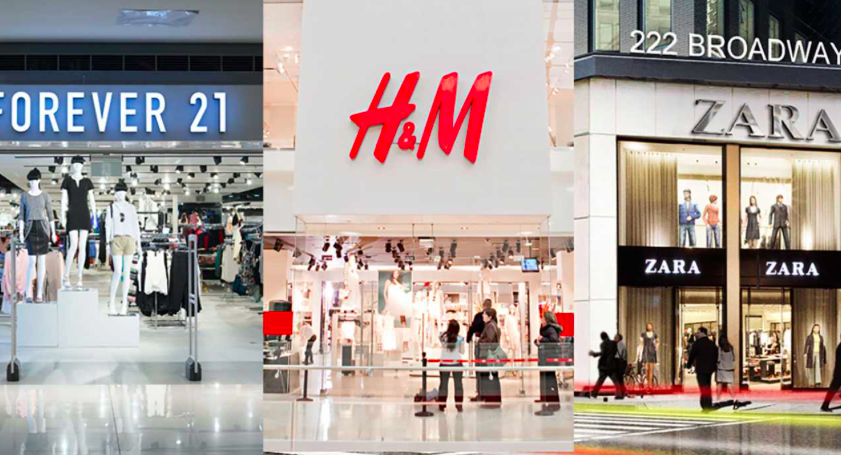Ditching Fast Fashion
September 25, 2020
As consumers, we tend to be drawn to shopping experiences that save us time, effort, and money. Though fast fashion may seem just like a quick and easy way to stay on top of the latest trends, there are severe consequences to feeding into this industry.
Many convenience-oriented shoppers can so easily neglect the idea of fast fashion being destructive, simply because it is in fact, convenient for them. Fast fashion is cheap and trendy so people may not think twice about the ethical and environmental ramifications that come along with purchasing a simple graphic tee or pair of jeans.
What is fast fashion?
Fast fashion is a term used to describe the rapid and inexpensive production of clothing to meet the latest fashion trends. Products go from the design stage to being sold in stores in just a matter of weeks. The term was coined by the New York Times when Zara, in New York, started its mission to go from designing a product to selling it in stores in only 15 days.
Though I admit, I am at fault for purchasing from fast fashion stores like Shein, I have made a vow to ditch fast fashion, and I think everyone should too. Here’s why:
Fast Fashion severely harms the environment
The fashion industry has been deemed the second most polluting industry in the world, following just the oil industry, by the UN Conference on Trade and Development.
The continuous production of new products creates an enormous demand for resources – specifically cotton. Toxic dyes and harsh pesticides used for cotton production turn in runoff and contaminate waterways, killing aquatic life.
Cotton production also requires an immense amount of water. It takes more than 5,200 gallons of water to produce enough cotton for one shirt and one pair of jeans.
50% of new clothes are made with polyester, a non-biodegradable synthetic fibre made from plastic. This will end up in oceans where ocean life will ingest it.

Fast Fashion production exploits workers
Around the world, about 430 million people work in textile production and fashion; 8 in 10 of these are women, and just 2% earn a living wage. Many are garment workers in Asia, risking their lives in a sweatshop, exposed to carcinogenic chemicals, simply to make ends meet.
Sweatshops workers in Bangladesh earn $33 a month, working 14-16 hours a day, seven days a week.
Fast Fashion items are extremely low quality
No one wants to keep a shirt that is falling apart at the seams! The fast fashion industry designs products in a way that are made to fall apart after just a few wears and washes, encouraging “throw-away” culture.
Fast fashion companies purposely release new trends, in a matter of weeks to make clothes outdated, causing people to buy more and wear less. This leads to overproduction, overconsumption, and an unprecedented amount of waste, in order to achieve their one and only goal; profit.
So… after all of this, what can you do?
- Become aware of companies that utilize fast fashion, and stop buying from them! Some of these companies include: ZARA, Shein, Forever 21, Gap, Old Navy, Zaful, H & M, Romwe.
- Support/purchase from companies that practice sustainable and ethical fashion. Some of these include: Levi’s, Patagonia, Ralph Lauren, Vera Bradley, Athleta. These companies take into account the workers and communities where items are produced, along with how it affects the environment.
- Buy locally and from smaller businesses; companies within the fast fashion industry often steal designs from small businesses anyways!
- Buy second hand! Try thrifting on portals like Depop and Poshmark.
- If you have to shop at stores that utilize fashion, try to take care of the items and do not throw them out when you are done with them. Instead donate them to thrift stores and charities, or upcycle them.
But the issue of fast fashion isn’t just a cause you can tackle through personal efforts; the spread of knowledge on the crisis is perhaps the most imporant way to combat it. Social media influencers know this better than anyone, and many have utilized their platforms to showcase their resources.
Erika Taylor, a student at LMU College of Business Administration, is a prime example of a conscious consumer. As an ambassador for Remake our World and a representative for Wear Wardrobe, Taylor hopes to promote sustainable living on a daily basis.
“The biggest benefit to ditching fast fashion is breaking away from mainstream trends and ‘being my own person,’” Taylor said.
Aside from simply living by her morals, Taylor has built a platform dedicated to spreading awareness on the harmful effects of fast fashion. Her TikTok, @erikatxylor, currently has over 19K followers, and the content she delivers ranges from lighthearted “Outfit of the Week” videos to grounded “sit down” exposés of the industry.
Taylor hopes to instill in her viewers that the industry is not working to benefit its customers; rather, it feeds off of trends within consumerism and manipulates buyers into falling for its ploys.
“I believe that most fast fashion brands hook their consumers in and create sort of a cult following, breaking away from that hold has resulted in the development of my own unique style,” Taylor said.
“Additionally, I can rest easier knowing that my shopping isn’t hurting others or the environment!”







